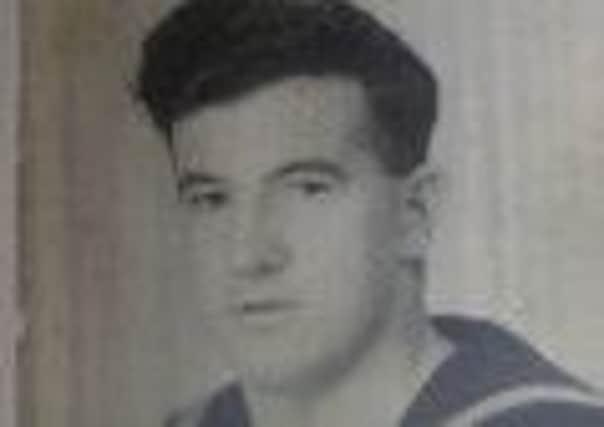Obituary: Thomas Lawson, Arctic Convoy veteran


Thomas Lawson was a teenage gunner when he embarked on “the worst journey in the world”, the perilous sea passage to protect the Arctic convoys supplying vital arms and equipment to Soviet troops fighting the Third Reich.
The voyages, from the north of Scotland around the northern tip of Norway and into the Arctic Circle to Murmansk and Archangel, were undertaken in some of the most appalling conditions of the Second World War – crews enduring not only the force of nature at its most vicious but the constant attacks from the Luftwaffe patrolling for targets.
Advertisement
Hide AdAdvertisement
Hide AdHowever, it would be another 70 years before his valour and that of the 66,000 fellow sailors who shared the ordeal of crossing those cruel and bitterly cold seas would be recognised. By then he was one of the few remaining survivors to personally receive the long fought for Arctic Star medal finally awarded by the British government in 2013.
The following year he was honoured by the Russians, sharing a shot of vodka with the Consul General who presented him with the Ukashov medal, the federation’s highest naval bravery award.
A Fifer through and through, he was born in Newburgh, the eldest of four children, but raised in Kirkcaldy where his family moved when he was a boy.
There he attended Gallatown Primary and Viewforth High Schools, leaving at 15 to start work in town’s Blyth’s factory. He was 17 when he joined the Royal Navy in the middle of the Second World War.
His first postings were to the other edge of the world, to Australia and New Zealand, before being sent as a gunner on HMS Undaunted, one of the destroyers which escorted the merchant convoys, laden with millions of tons of armaments, ammunition, vehicles, planes and other supplies, on the Arctic voyage to aid the Russians on the Eastern Front.
It was Churchill who described it as the worst journey, an environment so harsh that salt spray froze as it fell. The men themselves called them “suicide missions”. In total 78 convoys made the voyages navigating ice fields and mountainous seas while facing a constant threat from German U-boats, warships and planes.
More than 3,000 young men lost their lives in the icy waters with the sinking of 104 merchant ships and 22 Royal Navy vessels.
Lawson had joined the newly commissioned HMS Undaunted on escort duties in April 1944 at Scapa Flow and took part in an attempt to sink the German battleship Tirpitz, sister ship of the Bismarck, in a Norwegian fjord. Although the mission was unsuccessful, the operation did cause significant damage to the Tirpitz which was eventually sunk by RAF bombers that November.
Advertisement
Hide AdAdvertisement
Hide AdUndaunted was later deployed as part of the D-Day Landing force, covering part of Sword beach in Normandy, and ended up taking General Dwight Eisenhower, Supreme Allied Commander, on board and back to Portsmouth after the cruiser he had been on was damaged.
From there the Undaunted went back to Scapa Flow on Home Fleet duties before heading for the Mediterranean and Pacific. After Victory in Japan she sailed to Australia and then New Zealand for a refit, having covered 150,000 miles since being commissioned 18 months earlier.
On his return from the war, Lawson settled back in Kirkcaldy, where he would spend the rest of his life, and began working with local firm Thomas Menzies builders. He met his future wife Mary at Kirkcaldy Ice Rink and they married in the town’s Gallatown Church in March 1950.
Over the years he also worked for demolition contractors and later as a driver and odd-job man, only giving up work at the age of 75 – after undergoing by-pass surgery following a heart attack.
A busy man with little time for hobbies, he was an avid reader and particularly enjoyed the novels of naval writer Douglas Reeman – who had also seen service in the Arctic in the Second World War – and, having exhausted the library’s supply, would often re-read favourite books time after time.
He was also a fan of singers Daniel O’Donnell and Dominic Kirwin, staying at a hotel once owned by O’Donnell in Donegal where he returned to celebrate his 80th birthday.
Widowed in 1998, he remained fiercely independent until 2009 when he moved into a care home. It was only with the award of the Arctic Star medal four years later that his family became aware of his contribution to the Arctic Convoy campaign. A humble man, he had typically spoken little of the adversity faced during that dangerous period and by the time he received the honour he was suffering from dementia.
However, he was remarkably lucid on the day of the presentation, and was similarly so when the Ukashov medal was bestowed on him when the Russian Consul General in Edinburgh, Andrey Pritsepov, visited his care home last year.
Advertisement
Hide AdAdvertisement
Hide AdFor a fleeting time he was back to his old self, downing his vodka faster than the Russian officials to whom he chatted about his experiences on the convoys, recalling the rough seas and sub-zero temperatures. It was a moment of pride now encapsulated, with his medals, in the memory box created for him by his daughters.
Predeceased by his wife Mary, he is survived by his children Lynne and Anne, grandchildren Mark and Yvonne and his brother William.